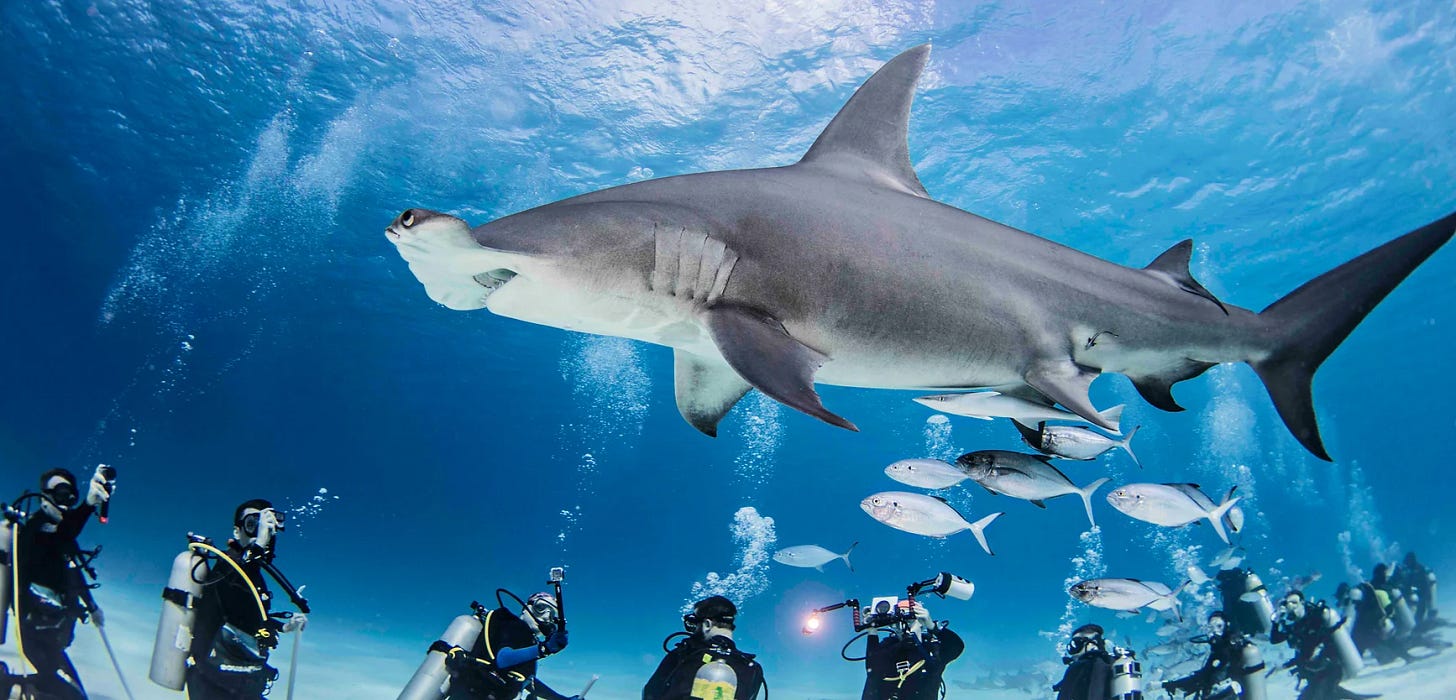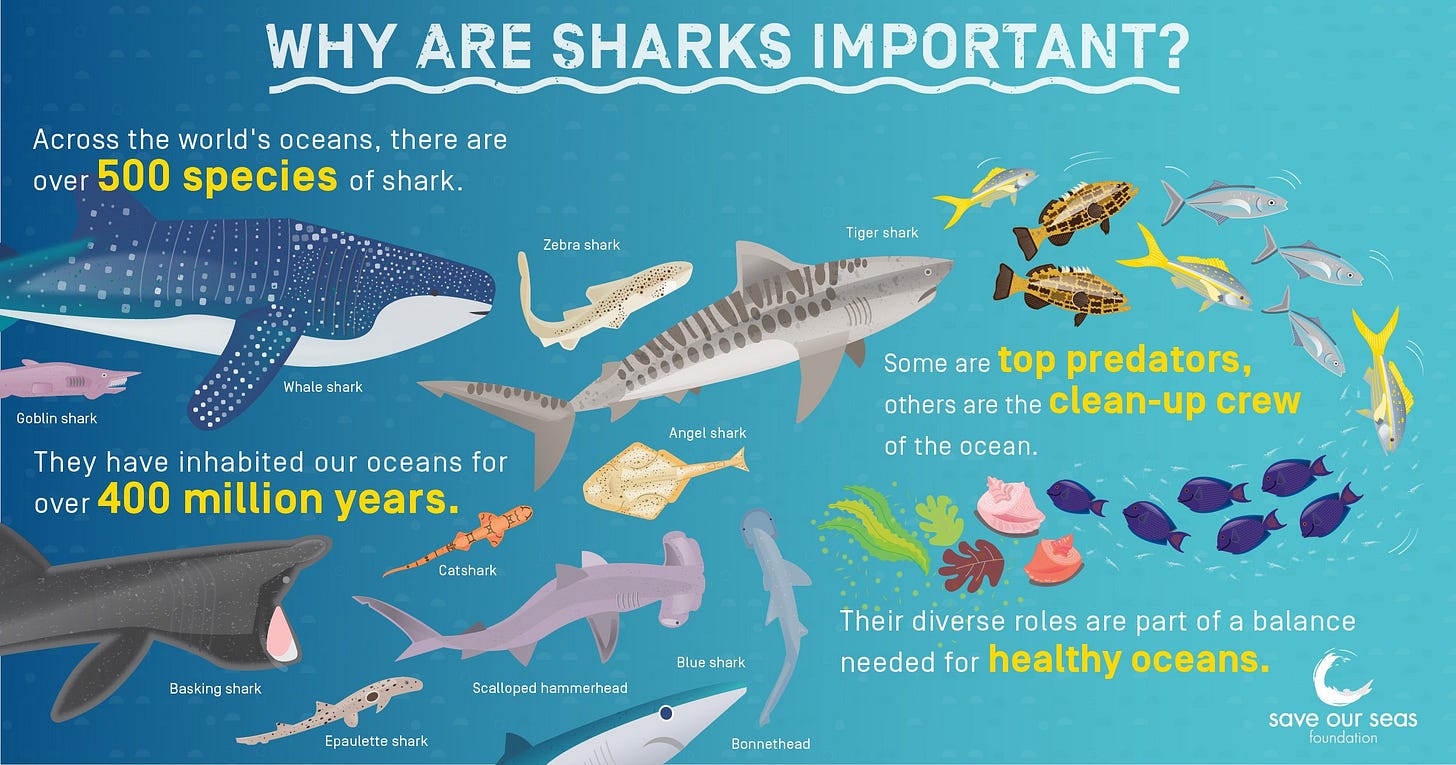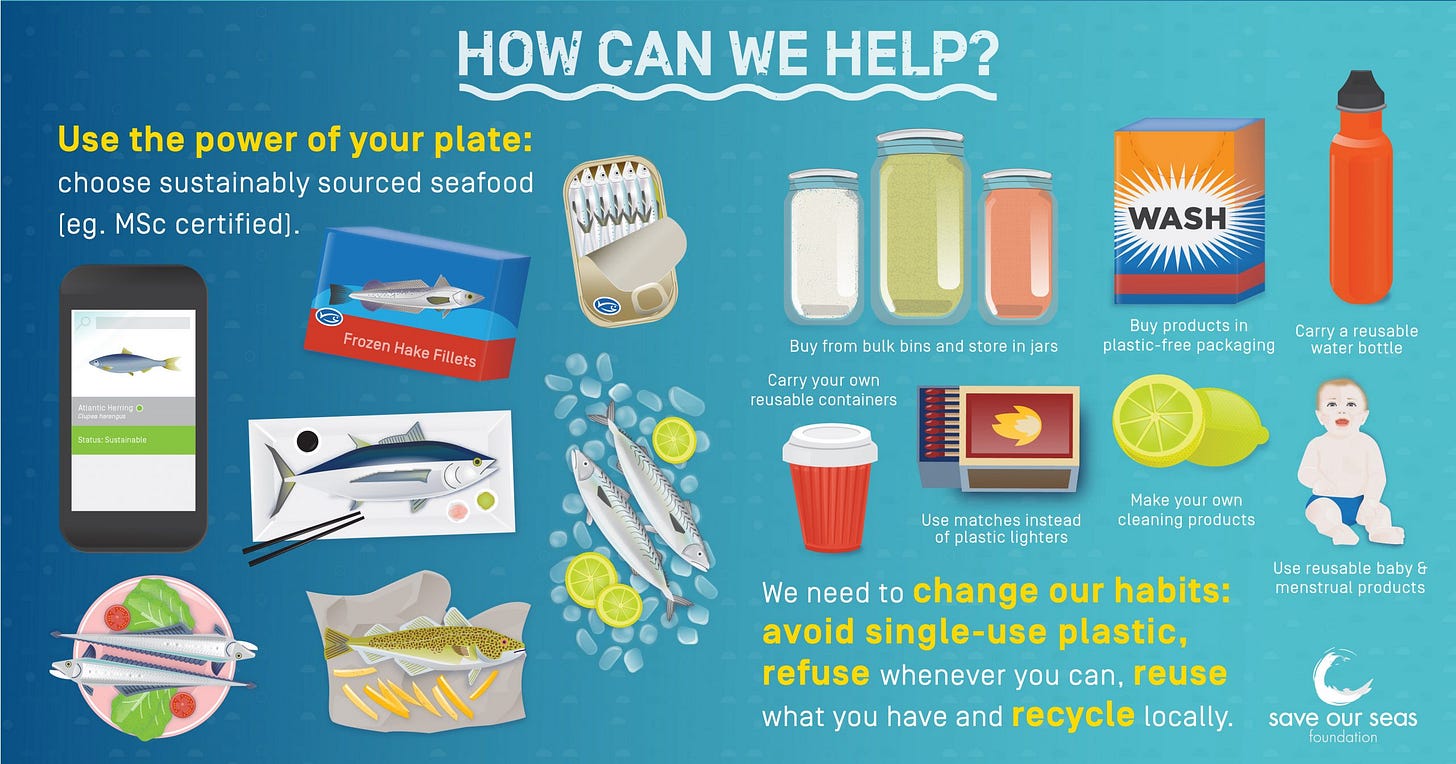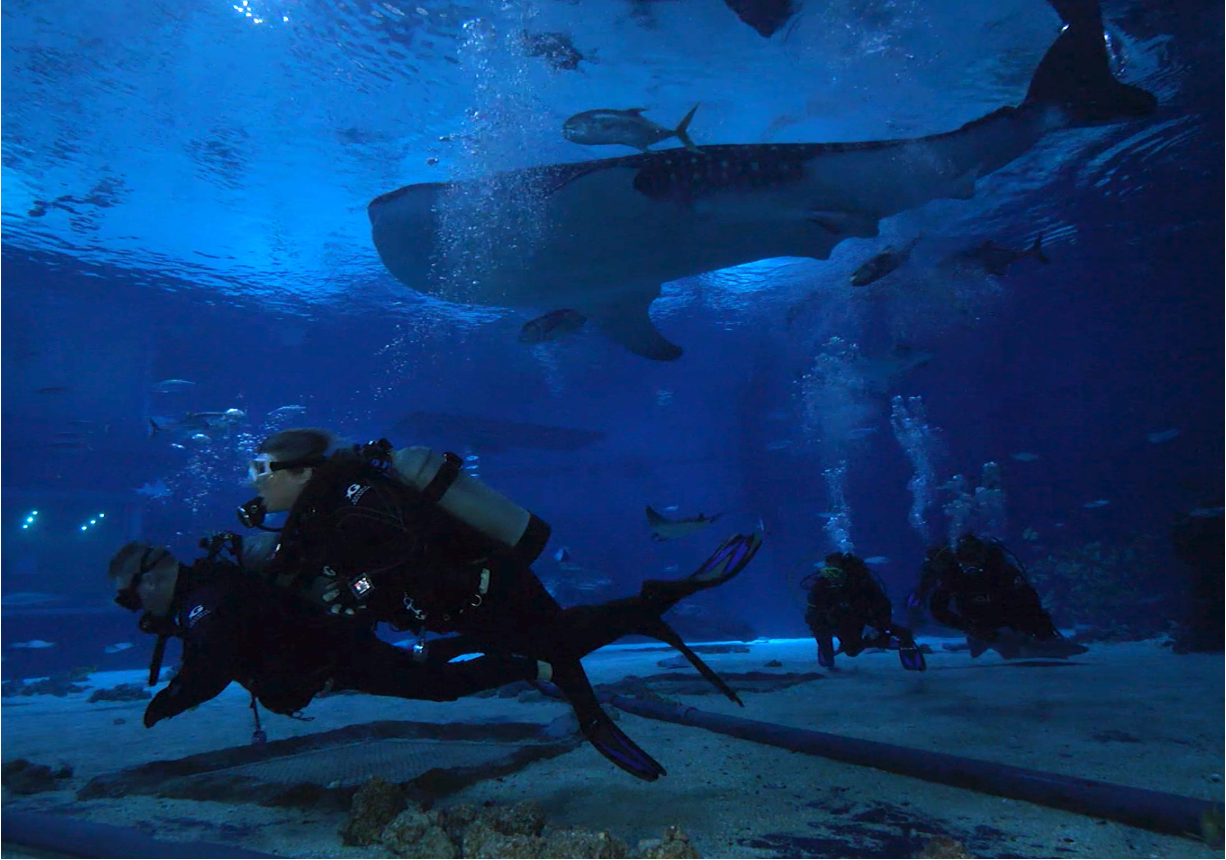Diving with Sharks
Dispelling fears and myths about these endangered animals

Hey everyone! In this post, I share my eye-opening experience of diving with sharks and how it changed my view of these misunderstood creatures. I use data to show why fears about sharks are extremely exaggerated, and discuss the critical role they play in marine ecosystems. Finally, I highlight the urgent need for conservation efforts to address declining shark populations due to human activities. I hope you enjoy! 🦈 — EJF
Up Close and Personal
Two weekends ago, I was 40 feet underwater surrounded by sharks in the Bahamas. For those two hours we watched in awe as five great hammerhead sharks swam around us gracefully and ate fish from our guides’ hands the same way our dogs take treats:
And those weren’t the only sharks we saw that weekend! The hammerhead experience also featured a few gentle nurse sharks lurking for scraps on the silty bottom (they’re kinda awkward creepers, TBH). On a separate dive we glided alongside several dozen reef and silky sharks:
We also saw plenty of bull sharks along the docks that weekend, but none crashed the party when we were in the water.
This trip wasn’t the first time I shared the water with these magnificent animals. We previously dove with massive whale sharks at the Georgia Aquarium in January, which was also awe-inspiring. However, those gentle giants are filter feeders that primarily eat plankton, and it was definitely more relaxing than entering the environment of predatory sharks.
These experiences were profound and have given me a great appreciation and respect for the ancient fish that predate the dinosaurs. Like many people, I grew up terrified of sharks. But as I’ve gotten into scuba diving and learned more about marine ecology, I’ve realized that even seeing a shark on a typical swim or dive is a rare treat, and they generally keep their distance from humans unless provoked or caught in the middle of feeding. Indeed, sharks are widely misunderstood, threatened by humans, and in need of our help to conserve them.
Bad Reputation
Right before we went diving, multiple friends and family sent us worried texts imploring us to be careful. Even though we were diving with a docile species of shark and being chaperoned by professionals who do this daily, many people thought we were crazy for getting in the water with any type of shark.
Why was everyone so terrified?
Well for one, it certainly didn’t help that just a few days before, a paddle boarder was tragically killed by a shark in the Bahamas. More broadly, sharks are often perceived as menacing predators, and are widely misunderstood and disproportionately feared in comparison to the actual risk they pose to humans. This is largely a result of sensationalized stories and stereotypes in pop culture—including books and movies like the ones below—that reinforce the image of sharks as prehistoric, indiscriminate killers, overshadowing their crucial role in marine ecosystems and the alarming threats they face due to human activities.
Misconceptions and Unwarranted Fear
Sharks have been vilified in public perception, conjuring images of terrifying creatures attacking humans without warning. However, statistics show a different reality. Globally, sharks are responsible for an average of only about five human fatalities per year, a figure significantly lower than many other causes of death. For example, people are more likely to be struck by lightning than attacked by a shark (the US alone averages 43 lightning deaths annually!) In fact, the risk of shark attacks is so low that it's considered infinitesimally small compared to everyday dangers like heart disease, cancer, or various accidents:
As you can see below, Google Trends data shows how lopsided peoples’ perceptions of risk are; despite being 4,800,000% more likely to die from gun deaths than a shark attack, the latter still dwarfs more pressing threats in terms of online search interest:

Shark Behavior and Ecology
Contrary to popular belief, sharks are not indiscriminate man-eaters. Most shark species feed on fish or invertebrates such as squid or clams, and humans are not a natural food source for them. In the rare instances of shark-human encounters, sharks often mistake humans for their usual prey, like seals or dolphins. The diversity in feeding behaviors among shark species is noteworthy, with some species like the whale shark being large filter feeders, while others like nurse sharks are bottom-dwelling suction feeders.
Sharks play a vital role in maintaining the balance of marine ecosystems. As apex predators, they help regulate the populations of various species, ensuring ecological balance. Their presence is crucial for the health of coral reefs, which are not only biodiversity hotspots but also have substantial economic value through tourism and fisheries. The decline of shark populations can have cascading effects on marine food chains and habitats.

People are the Biggest Threat to Sharks
Human activities pose a significant threat to shark populations. It's estimated that around 100 million sharks are taken from the oceans every year, leading to alarming declines in their numbers. Overfishing, illegal fishing, and the demand for shark fins have contributed to this decline. Sharks' slow reproductive rates make it difficult for their populations to recover from such extensive losses. This over-exploitation of sharks has sparked global concern and efforts towards conservation.

However, we need to be careful in how we discuss threats and solutions to shark conservation. In this iScience article, it's revealed how media portrayal often skews the reality of shark conservation. Oversimplification and bias in reporting, especially focusing on shark finning while ignoring broader threats, contribute to public misconceptions. Accurate, comprehensive media coverage is essential for effective shark conservation policies. This insight is crucial for our understanding and action in preserving these vital marine species.
“The most commonly mentioned threat, by far, was shark finning and the shark fin trade, mentioned in 1,222 articles (67.7% of articles, Figure 3) Although conflating shark finning and the shark fin trade is not a best practice (see definitions), this was done so often in these popular press articles that it was impossible to tease the two threats apart. In contrast, overfishing in general, which is a larger threat that includes but is not limited to shark finning, was mentioned in less than half of articles (742 articles, 41.1% of articles, Figure 3). The shark meat trade, which is a growing threat generally comparable with the shark fin trade, was mentioned in just 354 articles (19.6% of articles, Figure 3), often in the context of wrongly stating that there is not a significant shark meat trade but only a trade in shark fins”
Conservation Efforts
Efforts to protect sharks are underway, including advocating for better trade protections, addressing illegal and unregulated fishing, and reducing market demand for shark products. Some species have received international attention, leading to steps towards sustainable catch and legal trade. However, many shark species remain unprotected and heavily exploited, necessitating continued conservation efforts.

What can you do? There are a number of things!
Don’t buy products sourced from sharks
Eat sustainable seafood
Only patronize reputable, conservation-minded eco-tourism operations
Avoid plastics and reduce litter
Educate other people!

Conclusion
Sharks are often portrayed as the villains of the sea, but in reality, they are the ones at risk. They are not the indiscriminate killers as often depicted but are important regulators of marine ecosystems. The fear of sharks is greatly exaggerated in comparison to the actual risk they pose, and it's crucial to shift public perception to understand and protect these misunderstood creatures. As we learn more about their complex behaviors and cognitive abilities, it's clear that sharks are fascinating and essential members of the oceanic world, deserving of our respect and protection.

Quick Housekeeping Note: If you haven’t taken my reader survey yet, please consider doing so! It’s only a few questions and the data will help me improve my content for 2024 👇








I’ve been attacked by 3 sharks - a Tiger, who wanted the net full of fish we’ve been collecting for our marine biology Honours project on the GBR; a Great White in South Africa when I stuck my GoPro too close to its face; and a 7-Gill on a night dive in Fiordland after we accidentally disturbed its sleep.
Every time it was our/my fault by intruding on the sharks’ habitat or space, and every time we managed to avoid any serious harm by giving the shark what it wanted - the fish, its space, or its peace to sleep undisturbed. I still love and respect the hell out of sharks, and feel blessed whenever one chooses to share their space with me underwater.
Cool article. Sharks are fascinating creaturs but I had no idea there were so many species.